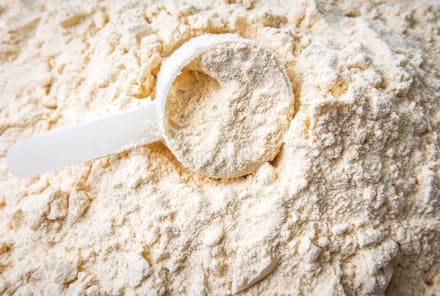Advertisement

When I was a teenager, I enjoyed singing and being onstage so much that I joined a semiprofessional music and theater group. However, I had a strange problem that kept me from improving. My voice would quickly become hoarse, even during rehearsals.
I went from one doctor to the next to figure out why I was becoming hoarse so quickly. Other singers in my group did not have this issue. I knew something wasn't right. Most doctors gave me an unhelpful shrug or suggested it was the result of pollen allergies. My discomfort continued throughout the changing seasons, so I doubted it was pollen. Soon the hoarseness occurred so frequently and came on so suddenly that singing became pointless, so I quit. It was pretty frustrating.
Handstands lead to...sore throats?
Years passed, and as an adult, I began to master the art of the headstand. I come from a family full of gymnasts, though I have not inherited much of the skill. Better late than never, I thought, and started practicing handstands daily. I did headstands or some type of inversion for at least 10 to 15 minutes each day. It was fun until about six weeks into the program when, lo and behold, I suddenly lost my voice. A few doctors’ visits later, I learned that I suffered from airway reflux. At first, my reaction was, "Wait… what? I don't even have heartburn. How can this be caused by reflux?"
However, after some research it started to make sense. Yes, reflux into the airways can cause hoarseness, and it does not cause heartburn in most people. Handstand training was the worst thing I could have done with this disease, as my stomach content was trickling back into my throat each time I was upside down. It didn't cause my reflux, but it caused the symptoms to worsen quickly. While the symptoms sucked, of course, the sudden worsening made it very apparent that something regarding my health was wrong and gave me a strong push to fix it.
What is airway reflux?
Airway reflux, which the scientific community calls laryngopharyngeal reflux1 (short LPR) is stomach content that escapes from the stomach into the airways. It is different from the type that causes heartburn, which is caused by liquid reflux. Instead, airway reflux has a gaseous form, a microscopically fine mist.
This makes airway reflux tough to detect, and doctors need special equipment to diagnose it. (That equipment did not exist until recently.) Now that there's more awareness of airway reflux in the medical community, there are increasing amounts of studies done on it, too. I know because I've been doing my best to stay abreast of new research and help others become aware of it.
How do I know if I have it?
The most common symptoms of airway reflux are hoarseness, chronic dry cough, sore throat, and sometimes asthma. In the past, physicians assumed those symptoms were normal for some people. It's difficult to pinpoint a cause for these symptoms. Maybe they had a hidden allergy, damaged their lungs by smoking, or they were simply getting old. Now it turns out reflux causes many of those seemingly random symptoms—and can have some serious consequences1 if left untreated, including cancer.
If you suspect you have airway reflux, I recommend booking an appointment with your doctor and asking for a referral to see an otolaryngologist. In the meantime, though, I've found there are things you can do to keep it at bay. Here are five things that have kept my airway reflux at bay, naturally:
1. Avoid late-night eating.
For many sufferers, hoarseness is most prominent in the morning. That is a result of eating too close to going to bed. Undigested food sits in the stomach the whole night. The stomach works very slowly during sleep. At the same time, our natural reflux defenses are less effective at night. For example, saliva helps to neutralize reflux during the day. During sleep, our bodies produce less saliva. Not eating three to four hours before bedtime is a simple but very effective tactic.
2. Don't overeat.
Sounds logical and easy enough, right? Still, we are all human. We like to eat—sometimes too much. Why is eating too much bad? The first line of defense against airway reflux is the lower esophageal sphincter2 (the "LES"). This valve sits between the stomach and the esophagus. Its job is to open only when we swallow to allow the food into the stomach. However, this sphincter valve can only hold back so much pressure. The more food is in the stomach, the more likely the valve will fail and leak.
Although the LES is a muscle, it works differently than the skeletal muscles in our body. It doesn’t become stronger with exercise. On the contrary, if we continuously stress the valve by overeating, it will weaken and become damaged over time. To avoid reflux, eat smaller and more frequent meals instead of a few big ones.
3. Decrease caffeine and chocolate consumption.
There are certain foods that can cause the LES to relax, which makes airway reflux more frequent. Some prominent examples: Chocolate contains a substance called theobromine, which relaxes the LES valve. So, yes, chocolate isn't your friend if you have airway reflux. Caffeine has the same effect3, just not as extreme, so avoid coffee or at least drink less. I know firsthand how hard these lifestyle changes can be.
To be honest, I still drink a coffee most days. I am simply a coffee addict. However, because I know that coffee is bad for reflux, I limit myself to one small cup of coffee or one espresso shot per day.
4. Skip soft drinks and fizzy sodas.
Acidic drinks are your worst enemy if you have airway reflux. The reflux contains pepsin, a stomach enzyme whose job is to digest protein. Pepsin is doing most of the damage in airway reflux....if it gets into the airways, it "digests" the cells there. Over time, a considerable amount of damage can accumulate.
Did you know that colas and similar fizzy drinks are as acidic as lemon juice? They don’t taste so because of all the added sugars. Most fruits are acidic as well so it is best to avoid drinking their juices, with the exception of bananas, melons, and coconuts. It is important to avoid acidic foods and drinks when you have airway reflux.
5. Drink alkaline water.
We can counter pepsin by bringing it into contact with an alkaline substance, neutralizing airway reflux. Alkaline water is perfect for that. You can easily make alkaline water at home with baking soda4 (not baking powder; they are definitely not the same). Mix half a teaspoon of baking soda into one cup of water. It’s that simple. Gargle with it and drink a few sips when your symptoms are most prominent. Of course, talk with your doctor about any symptoms, concerns, and precautions you are taking when it comes to airway reflux.
Watch Next
Enjoy some of our favorite clips from classes
Enjoy some of our favorite clips from classes
What Is Meditation?
Mindfulness/Spirituality | Light Watkins
Box Breathing
Mindfulness/Spirituality | Gwen Dittmar
What Breathwork Can Address
Mindfulness/Spirituality | Gwen Dittmar
The 8 Limbs of Yoga - What is Asana?
Yoga | Caley Alyssa
Two Standing Postures to Open Up Tight Hips
Yoga | Caley Alyssa
How Plants Can Optimize Athletic Performance
Nutrition | Rich Roll
What to Eat Before a Workout
Nutrition | Rich Roll
How Ayurveda Helps Us Navigate Modern Life
Nutrition | Sahara Rose
Messages About Love & Relationships
Love & Relationships | Esther Perel
Love Languages
Love & Relationships | Esther Perel


















